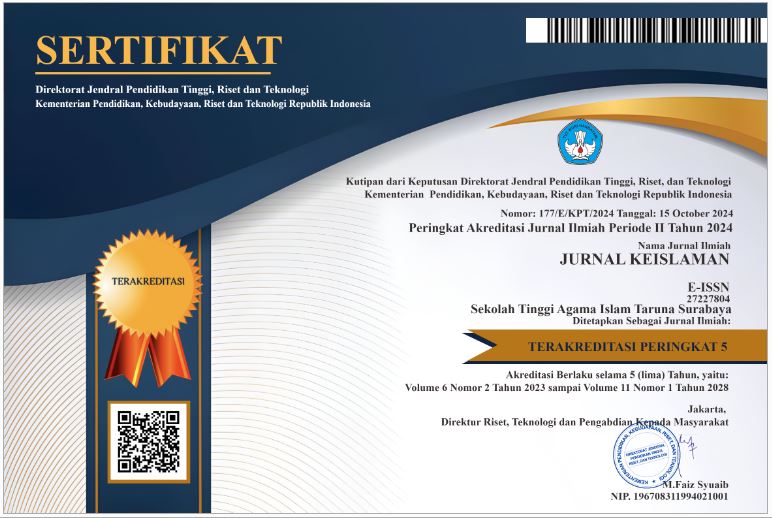Relevansi Sila Ketuhanan Yang Maha Esa Dengan Pengamalan Tauhidullah Bagi Masyarakat Muslim di Indonesia
DOI:
https://doi.org/10.54298/jk.v7i2.245Keywords:
Pancasila, Muslim, TauhidullahAbstract
This article discusses the relevance of the first principle of Pancasila for the realization of religious harmonization in Indonesia, which is still seen as contrary to the concept of tauhidullah for muslim communities in Indonesia. The author identifies these problems, including the relationship between the first principle or Pancasila and tauhidullah, the relationship between muslim and non muslim in national and state life, as well as the relevance of the principle og Belief in One Almighty God and tauhidullah fir muslim community in Indonesia . The result of the research include: (1) The relationship between the first principle of Pancasila and the concept of tauhidullah, namely that both attempt to teach the concept of the oneness of God; (2) The first principle of Pancasila and the concept of tauhidullah teach the importance of good relations between muslim and non muslim in the live of plural society in Indonesia; (3) The rinciples of belief in the Almightty God and the concept of tauhidullah have close relevance, especially maintaining tolerance between religious communities.
Downloads
References
Abdul Rohman, Asep Badruzaman, Nurul Huda, ‘Masa Depan Demokrasi Islam di Indonesia’, Sophist: Jurnal Politik Kajian Islam dan Tafsir, 2.2 (2020), 163-182. https://doi.org/10.20414/sophist.v2i2.29
Asyhar Hidayat., Dkk, Buku Ajar Pancasila, Bandung: LSIPK Unisba, 2018.
Aspandi. ‘Halal dan Haram Natal: Tinjauan Ulama Tentang Mengucapkan dan menghadiri Natal’, Al-Adalah: Jurnal Syari’ah dan Hhukum Islam, 3.3 (2018), 225-234. https://doi.org/10.31538/adlh.v3i3.412
Depri Liber Sonata, ‘Metode Penelitian Hukum Normatif dan Empiris: Karakteristik Khas Dari Metode Meneliti Hukum’. Fiat Justisia Jurnal Ilmu Hukum, 8.1 (2014), 15-35. https://doi.org/10.25041/fiatjustisia.v8no1.283
https://tafsirq.com/topik/Surat+al+Baqarah+ayat+163
Irwansyah, Metode Penelitian Hukum (Pilihan Metode dan Praktik Penulisan Artikel), Yogyakarta, Mitra Buana Media, 2001.
Irwansyah, M. Sidik, Muhammad Sibawaih, ‘Haemonisasi Pancasila Dengan Agama Dalam Persfektif Hukum Islam’, Jurnal Cerdas Hukum, 1.1 (2022), 69-79.
Juhra Mumammad Arib, ‘Ucapan Selamat Natal Menurut Quraish Shihab Dalam Tafsir Al-Misbah (Studi Analisis Terhadap Q.S. Maryam Ayat 33)’. Jurnal Aqlam, 2.1 (2016), 11-21. http://dx.doi.org/10.30984/ajip.v1i2.502
Khusnul Khotimah, ‘Penerapan Pancasila Bersfektif Islam’, Tahdzib Akhlaq, 6.2 (2020), 81-101. https://doi.org/10.34005/tahdzib.v3i2.1037
Mahmud Yunus, Kamus Arab-Indonesia, Jakarta: PT. Mahmud Yunus Wa Dzurriyah, 2010.
Martin Roestami, ‘Kontemplasi Pancasila Dalam Tauhid’, Jurnal Sosial Humaniora, 1.1 (2010). https://doi.org/10.30997/jsh.v1i1.76
M. Saifullah Rohman, ‘Kandungan Nilai-Nilai Syariat Islam Dalam Pancasila’. Millah, 23.1 (2013), 206-216.
Muhajirin dan May Dedu, ‘Maslahah Mursalah dan Implementasinya Dalam Akad Muamalah (Hukum Ekonomi Syariah)’, Al-Mashlahah: Jurnal Hukum Islam dan Pranata Sosial Islam, 9.1 (2021), 172-200. https://doi.org/10.30868/am.v9i01.963
Muqtashihin Fahrusy Syakirin Al-Mazmi, ‘Hukum Non Muslim Sebagai Pemimpin Muslim Ditinjau Dari Persfektif Tafsir Ibnu Katsir’, Tapis, 1.2 (2017), 215-231 https://doi.org/10.32332/tapis.v1i02.795
Nabila Ramadhian dan Ni Luh Made Pertiwi. F, ‘10 Ucapan Hari Raya Nyepi 2021 Yang Penuh Makna’, 2021. https://amp.kompas.com/travel/read/2021/03/13/142500027/10-ucapan-hari-raya-nyepi-2021-yang-penuh-makna
Nurul Fajri, ‘Diskursus Kontestasi Agama dan Negara Reposisi Tauhid Sosial dan Nilai-Nilai Pancasila (Kajian Terhadap QS. AL-Kafirun dan al-Ikhlas)’, Jurnal Sosiologi Agama: Jurnal Ilmiah Sosiologi Agama dan Perubahan Sosial, 14. 1 (2020), 1-20. http//doi.org/10.14421/jsa.2020.141-01
Panitia Penyusun Tafsir Juz’ama Unisba, Tafsir Juz’ama Universitas Islam Bandung (Edisi Revisi), Bandung: Lembaga Studi Islam Unisba, 2011.
Pusat Pembinaan dan Pengembangan Bahasa, Kamus Besar Bahasa Indonesia, Jakarta: Balai Pustaka, 1994.
quranbest.com, https://quranbest.com/al-quran/
quran.nu.or.id, https://quran.nu.or.id/ali-imran/103
Laode Moh. Nanang Pribadi Rere, ‘Persfektif Al-Qur’an Terhadap Nilai-Niai Pancasila’, Al-Dhikra: Jurnal Studi Quran dan Hadis, 2.1 (2020), 61-82.
Rini Irianti Sundary., Dkk, Buku Ajar Pendidikan Kewarganegaraan Untuk Perguruan Tinggi, Bandung: LSIPK Unisba, 2018.
Septiana Rizco Nurfaizi, ‘Kepala Negara Dalam Sistem Ketatanegaraan Isndonesia Persfektif Siyasah Islam’. Diktum: Jurnal Syariah dan Hukum, 18.2 (2020), 233-247. https://doi.org/10.35905/diktum.v18i2.1409
Syofrianisda, ‘Kajian Hadith Tentang Salam Dalam Buku Fiqih Lintas Agama (FLA)’, Univeasum, 11.1 (2017), 113-130. https://doi.org/10.30762/universum.v11i01.724
Syaikh Mumammad bin Shalih AL-Utsamin, ‘Mengucapkan Selamat Hari Raya (Natal, Tahun Baru Kepada Non Muslim)’, 2021. https://almanhaj.or.id/2406-mengucapkan-selamat-hari-raya-kepada-non-muslim.html
Syamsul Bahri, ‘Mengucapkan Selamat Natal dan Selamat Hari Raya Agama Lain’, Kalam: Jurnall Agama dan Sosial Humaniora, 4.2 (2016), 36-56. https://journal.lsamaaceh.com/index.php/kalam/article/view/21/20
Tariyanah, ‘Hubungan Muslim Dengan Non-Muslim Dalam Al-Qur’an Persfektif Metode Kontekstual Abdullah Saeed’. (Skripsi), Jurusan Ilmu Al-Qur’an dan Tafsir, Fakultas Ushuludin, Arab dan Humaniora, Institut Agama Islam Negeri Salatiga, 2017. http://e-repository.perpus.iainsalatiga.ac.id/2757/1/SKRIPSI_TRIYANAH_IAT_FUADAH.pdf
Undang-Undang Dasar Negara Republik Indonesia Tahun 1945.
Downloads
Published
How to Cite
Issue
Section
License
Copyright (c) 2024 Abdul Rohman

This work is licensed under a Creative Commons Attribution-ShareAlike 4.0 International License.
Authors who publish with this journal agree to the following terms:
- Authors retain copyright and grant the journal right of first publication with the work simultaneously licensed under a Creative Commons Attribution-ShareAlike 4.0 that allows others to share the work with an acknowledgement of the work's authorship and initial publication in this journal.
- Authors are able to enter into separate, additional contractual arrangements for the non-exclusive distribution of the journal's published version of the work (e.g., post it to an institutional repository or publish it in a book), with an acknowledgement of its initial publication in this journal.
- Authors are permitted and encouraged to post their work online (e.g., in institutional repositories or on their website) prior to and during the submission process, as it can lead to productive exchanges, as well as earlier and greater citation of published work (See The Effect of Open Access).


















